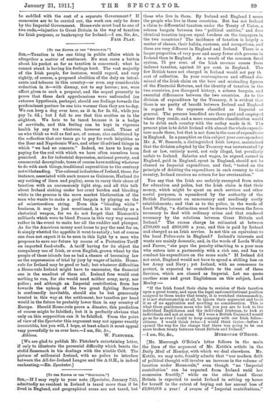I To THE EDITOR OF THE " SPECTATOR."1 Sin,—Taxation is
the one thing in public affairs which is altogether a matter of sentiment. No man cares a button about his pocket so far as taxation is concerned; what he cannot stand is having his feelings hurt. The vast majority of the Irish people, for instance, would regard, and very rightly, of course, a proposed abolition of the duty on intoxi- cants and tobacco in this country—or even any considerable reduction in it—with dismay, not to say horror; nor, were effect given to such a proposal, and the sequel presently to prove that these dark apprehensions were unfounded (an extreme hypothesis, perhaps), should our feelings towards the predominant partner be one iota warmer than they are to-day. We can keep a dog over here, as it is, for 2s. 6d., while you pay 7s. 6d.; but I fail to see that this soothes us in the slightest. We hate to be taxed because it is a badge of servitude, and this feeling can be kept in vigorous health by any tax whatever, however small. Those of us who think as well as feel are, of course, also embittered by the reflection that our taxes go to pay for such iniquities as the Boer and Napoleonic Wars, and other ill-advised things in which " we had no concern." Indeed, we have to keep on paying for the rod with which we have often ourselves been punished. As for industrial depression, national poverty, and commercial decrepitude, taxes of course have nothing whatever to do with such things, traditional superstition to the contrary notwithstanding. The colossal industries of Ireland, those, for instance, associated with such names as Guinness, Harland (to say nothing of linen and poplin), seem to carry their share of taxation with an uncommonly light step, and all this talk about Ireland sinking under her cruel burden and bleeding white in the process is the mere market blatheration of the man who wants to make a good bargain by playing on the ad misericordiam string. Even this "bleeding white " business, it may be just mentioned, is a bit unlucky as a rhetorical weapon, for we do not forget that Bismarck's milliards which were to bleed France in this very way seemed rather in the event to make her all the ruddier and plumper. As for the American money sent home to pay the rent for us, it simply whetted the appetite it went to satisfy ; but of course one does not expect it to be seen in this light by a man who proposes to save our future by means of a Protective Tariff on imported food-stuffs. A tariff having for its object the compulsory use of Irish, or even English, grown wheat by the people of these islands has as bad a chance of becoming law as the supersession of trial by jury by wager of battle. Home- rule for Ireland may he good or bad ; but whatever difficulties a Home-rule Ireland might have to encounter, the financial one is the smallest of them all. Ireland free would cost nothing to run, for she would need neither army, navy, nor police ; and although an Imperial contribution from her towards the upkeep of the two great fighting Services is confessedly inevitable, should she be but generously treated in this way at the settlement, her taxation per head would in the future be probably lower than in any country of Europe. Should Home-rule prove a disaster, this prediction of course might be falsified; but it is perfectly obvious that only on this supposition can it be falsified. From the point of view of the Spectator this argument may not appear exactly irresistible, but you will, I hope, at least admit it must appeal very powerfully to us over here.—I am, Sir, &c.,
[We are glad to publish Mr. Fletcher's entertaining letter, if only to illustrate the perennial difficulty which besets the stolid Sassenach in his dealings with the nimble Celt. The picture of millennial Ireland, with no police to interfere between the All-for-Ireland League and the A.O.H., is indeed enchanting.—En. Spectator.]










































 Previous page
Previous page